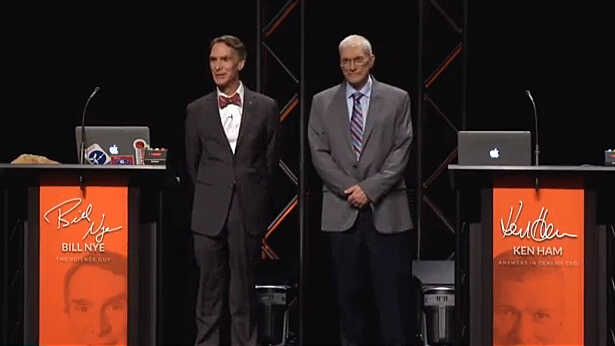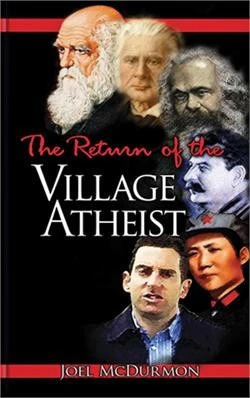
Al Kimeea’s Hammed & Unsophisticated Sophistry
Earlier this week, I decided to Google my name alongside that of Ken Ham and Bill Nye to see what sort of response, if any, was generated by the piece I wrote, titled “Nuances missed in debate over creationism” for the Toronto Star on February 10th, 2014, regarding the Ham/Nye debate on creation and evolution. I found 3 different commentaries or inclusions, so I was happy to see that my piece did generate some discussion. One author simply quoted my piece at the end of an article on his website. Another author, Harold Rathlou, responded to my piece on February 14th, indicating his dissatisfaction with the two debaters and opting for a third option, which seemed to be pantheism. The third author, who goes by the pseudonym al Kimeea, wrote a rather trite response on his blog, quackademiology.com. It contained more vitriol than substance, as seen through the use of ad hominem attacks in the form of pejorative descriptors such as “sophisticated theologian,” “nascent doctor of tall tales”, “someone [who’s] playing bagpipes”, “attempting to appear wise,” and “fledgling papist.” Such ad-hominem fallacies reveal more about al Kimeea’s ill-conceived notions than my actual position.

I would simply like to expose the weaknesses of the blogger’s argumentation. Let me address the author’s comments one by one. I will quote his responses to my original article and provide counter-responses below them in bold font.
“Let’s be clear, the debate failed to deliver the answer Ventureyra wanted – doG did it on the sly.”
I didn’t want or expect a particular answer from the debate between Bill Nye and Ken Ham. The purpose of my opinion piece for The Toronto Star was to show the common reader that this is not the epicenter of scholarship or thought in academia with respect to the field of science and theology. It is neither a depiction of reflective audiences of creation-evolution dialogues but representative of just one out of a series of other typologies (such as independence, dialogue, and integration). I’m very well acquainted with both their positions; I just happen to disagree with them for scientific, philosophical, and theological reasons. There’s nothing in my position or that one can gather from my piece that I believe that God created in either a secretive or deceptive manner. Simply because I don’t hold a literalist view of Genesis does not signify this. I just have no good reason to read the two narratives in Genesis (Genesis 1:1–2:3; 2:4–25) in a non-figurative manner.
I argued precisely contrary to the claim that “God did it on the sly.” When I list certain signposts to creation or design, including the universe itself, the laws of physics and chemistry, the first replicating system or organism, and consciousness, it seems to me that such phenomena are more coherent under a theistic framework than a naturalistic one. So, rather than being “sly,” it would be evident to many who choose to follow the evidence wherever it leads. Nonetheless, these issues are a matter of great debate among systematic theologians and atheistic and theistic philosophers who specialize in the philosophy of religion.
I can’t help but point out that the field of natural science and theology is a burgeoning discourse with the potential for valuable new discoveries, insights, and possible practical and social implications. Despite popular caricatures that the two great fields are at odds with one another, the two have had much to say to one another in mutual cooperation throughout history. Today, just as historically, the two disciplines have much to offer one another. In relatively recent years, ever since the 1960s, a number of peer-reviewed journals devoted to the dialogue have sprung into existence, including: CTNS: Theology and Science Journal, The European Journal of Science and Theology, Zygon: Journal of Science and Religion, and the most recent journal titled Philosophy, Theology and the Sciences. Indeed, the field is growing and gaining interest from scholars of a variety of disciplines who are attentive to participating in this blossoming interaction.
“The media was not involved in setting up this event, they merely report on it. It was arranged by Ham at his Ark Park because Nye said teaching children Creationism is harmful to them and society as a whole.”
I never stated that the media was involved in the setup of this event. My claim still stands that the media prefers hype over substance. Debates revolving around evolution, such as one in 2009 over the viability of Intelligent Design between William Lane Craig (PhD philosophy, PhD theology) and Francisco Ayala (PhD biology, PhD theology), who are top thinkers in their respective fields, never received such media coverage and exposure. The YouTube video with well over 2 million hits for the Ham/Nye debate exemplifies this in comparison to the only two thousand and something hits for the Craig/Ayala debate. My point is that the larger lay population is not aware of this and that it’s time they hear of other viewpoints beyond the stereotypes in mainstream media.
“This fella doesn’t seem to realize Ham just knows in his heart that the earth is aboot 6000 years old – a YEC who most certainly does take the BuyBull literally as do 42% of Americans as of 2005. Add another 18% with a more nuanced view that involves life evolving “over time through a process guided by a Supreme Being” and, of course, the timeline becomes a major sticking point.”
Again, I’m pointing this out for the larger audience in case they get the wrong impression that you have to believe in a young earth/universe in order to be a consistent Christian, which couldn’t be further from the truth, as I have already explained regarding a non-literal reading of the book of Genesis. Contrary to the allegation, I do realize Ham’s beliefs and motivations.
“Ventureyra glosses over anything Nye may have said and shows, again, his ignorance of what Ham is about. It isn’t the laws of physics and chemistry or any scientific indicators of any kind – these are anathema. Ham is all Biblical authority, nothing else. Authority which our Catholic scribe is here attempting to describe as scientific signposts.”
I’m not glossing over anything Nye is saying. In a short piece that is supposed to be less than 300 words, I am limited in what I am able to write. I stated that Nye presented good evidence for an old earth of 4.5 billion years and a universe of 13.7 billion years. Nye has the evidence here. I know that Ham holds his narrow interpretation of Scripture over everything else; that’s not the issue. The issue is that there are so many better ways to argue for creation and design, and that Ham misses the boat with his whole approach. Ham is far from being a biblical scholar. I let the biblical scholars argue about how to interpret ancient texts in their original language. The majority of biblical exegetes would take issue with Ham’s position. So, in order to have a fuller picture from a science-theology standpoint, one must take into account what the biblical exegetes, theologians, philosophers, and scientists say in order to have a well-grounded picture of how to interpret the origins and emergence of particular phenomena in the natural world.
“Ah yes, the God of the Final Gap anally coughing up creation, re branded all science-like as let there be light The Big Bang. With this argument, Ventureyra reveals himself to be an Old Earth Creationist, like very many liberal Christian cultists who bleat a very similar non-literal reading of the BuyBull. Unlike most Christians Ventureyra has probably read the whole Bibble. Since he is a Sophisticated Theologian, he likely applies the Augustinian “get outta jail free card” – all nice things in the Buybull are true, while all the hatred, violence & genocide are metaphorical.”
This is not a “God of the Gaps” argument at all. Science alone does not get you to a sound argument about God; it is the use of scientific evidence in a philosophical premise of an overall argument that builds the case for God’s existence. For example, something like the Kalam Cosmological Argument (KCA), which states that: 1. Whatever begins to exist has a cause. 2. Universe began to exist. 3. Therefore, the universe has a cause, accomplishes this. This argument is hotly debated in peer-reviewed philosophical journals among philosophers of religion. Moreover, the same is true for atheism, namely that a scientific model or theory on its own cannot justify a certain belief system like atheism or theism; it is only once you couple it with a philosophy that you have an argument that can be used to support the particular worldview.
The evidence for big bang cosmology would be used to justify the second premise, but nowhere is this seen as a “God of the Gaps” argument; it is a sound argument where the conclusion follows logically from its premises. The onus is on the one who disagrees with the argument to demonstrate which of the premises is false and why.
I deny the allegation that I am an old-earth creationist just because I accept modern scientific findings. Here’s a shocker: I even accept universal common descent. I don’t take issue with the findings of modern science; if anything, when combined with sound philosophical argumentation, these present very reasonable arguments for God’s existence, which for the time being are more plausible than their denial. Below are several arguments that favour Christian theism that depend on the best scholarship from theology, philosophy, science, and history:
The Evolutionary Argument Against Naturalism:
Al Kimeea’s view of Augustine’s position regarding scriptural interpretation is overly simplistic and fallacious. As Augustine recognized, the task of any serious theologian or thinker, for that matter, is to use proper hermeneutics (an adequate mode of interpretation). Contrary to what al Kimeea may be aware of, the bible is not one singular book but rather a “library” of at least 66 books (the Protestant bible), 73 (the Roman Catholic bible), and 78 (the Eastern Orthodox bible)—all containing 27 New Testament (NT) books with varying numbers of Old Testament (OT) books since the Catholic and Orthodox OT contain deuterocanonical texts. Moreover, the Bible contains a number of different literary genres: law, history, wisdom, prophecy, the gospel, epistles, and apocalyptic. Not all texts are meant to be interpreted in the same manner, and all have many different layers of understanding.
It’s interesting that later I am lumped together with non literal “liberal” Christian cultists, since I don’t dispute the modern scientific calculations of the age of the earth and universe. To my understanding, OECs are not necessarily liberal. The designation of “liberal,” “conservative,” or “traditional” depends more on the overall view one takes on doctrinal issues. It is worth pointing out here that the Christian theist, in this particular case, is free to follow the evidence wherever it may lead. Augustine pointed out that God could have created the universe and organisms with certain potencies to allow for evolutionary change. indicating that the Genesis creation narratives allow for a number of different interpretations, such that one can adopt a number of different views regarding creation and evolution. Notice that Augustine made this interpretation over 1,400 years before Charles Darwin’s theory of evolution, so it is silly to think that Christian theism is retreating from such a position. This is more of an in-house Christian debate. As Alvin Plantinga, the esteemed philosopher of religion, has pointed out, for the atheist, there is only one game in town: naturalistic evolution. So, you have to feel sorry for the atheist since the options are so very limited.
“Ham’s “valid points”, neither of which offer any evidence for Creationism, are almost nonsense. Being a good scientist depends on being able to say “I don’t know” and, when evidence mounts, “Hmmm, seems my idea is wrong”. Good scientists don’t assign supernatural agency to things they don’t understand, regardless of their field of study. While the various meanings of evolution may be conflated, I’ll bet quatloos to doughnuts it isn’t good scientists doing the conflating.”
Ham’s point that creationists can be good scientists still stands, not only because there are examples of creationists who have both historically and contemporaneously contributed much to science but also because of the relevance to the debate. Here’s a historical example: William Thomson, Lord Kelvin (1824–1907), with his work on the mathematical analysis of electricity and his formulations of the first and second laws of thermodynamics. Here’s a contemporary example: Raymond Vahan Damadian, who invented the magnetic resonance imaging (MRI) scanner, provided the illustration, which is especially relevant to the discussion because it addresses Bill Nye’s concern that America may fall behind in the technological race due to much of the population’s views on evolution. Al Kimeea kindly pointed out that Nye believes that teaching children creationism is harmful to them and society. This point shows that claim’s fallacy. The point is that regardless of one’s views on evolution, one can still perform fruitful science, particularly in technological advances. The correlation between belief in biological evolution and society’s technological advancement is lost on me. This is not to say I support the teaching of 6 day creation in science classrooms—I do not. But it should be mentioned that if we look at biological systems as being designed and we mimic such designs, this will be a greater aid to technological advancement as opposed to looking at these systems as emerging through blind processes as the materialistic scenario of evolution entails (from the perspective of the blind-watchmaker synthesis). Perhaps the converse is more harmful to technological advance, namely the view that a blind materialistic process can account for much of the beauty and comprehensibility we see in nature. We don’t use principles of blind-materialistic processes to advance technology; rather, we implement purposeful, intentional design plans. Steven Fuller, a sociologist and philosopher of science, has made the point that scientists who see the universe and biological systems as the result of purposeful design are more likely to resolve difficulties in science, as has been demonstrated historically, regardless of whether there truly exists a designer or not. It’s also worth mentioning that there is debate among scientists and philosophers over whether a correct interpretation of Neo-Darwinism necessitates a blind-watchmaker view or not. A helpful introduction to this would be the dialogue between Jay Richards and Alvin Plantinga.
As an aside, there was controversy over Damadian not receiving the award for the Nobel Prize for his contribution to the invention of the MRI scanner. Noted philosopher of science, Michael Ruse, in his 2004 article, ”The Nobel Prize in Medicine—Was there a religious factor in this year’s (non) selection?” states:
I cringe at the thought that Raymond Damadian was refused his just honor because of his religious beliefs. Having silly ideas in one field is no good reason to deny merit for great ideas in another field. Apart from the fact that this time the Creation Scientists will think that there is good reason to think that they are the objects of unfair treatment at the hands of the scientific community.
Scientific advancement is predicated on what scientists actually know, which, while admitting ignorance at certain stages, allows them to re-examine and correct the mistakes in their hypotheses, experiments, observations, models, and theories—to the point where they can either augment or discard invalid theories. Knowledge is what fuels scientific advancement, not ignorance, contrary to what al-Kimeea may have you believe. It is that quest for knowledge and understanding that undergirds all intellectual endeavours.
Good working scientists do indeed conflate the term “evolution” when reaching a lay audience, quite different from how they specify the term in its context in peer reviewed articles. For whatever reason this is done, I don’t know, but nonetheless, it has the tendency to be misleading and sloppy.
“What we have here is someone playing bagpipes while attempting to appear wise and open minded by adopting a middle position regardless of the evidence either speaker may have supporting their argument. Truth be told, the good Doctoral Candidate has no more sophisticated evidence than the Creationist. It is quite possible Ham wouldn’t even consider the fledgling Papist a Christian.”
I must say that although al-Kimeea has clearly demonstrated a lack of open-mindedness to views other than his own, it sure looks like his brain has fallen out.

If there is any level of inexperience, it is on the one who accuses me of such. The author indeed seems to possess an extremely limited understanding and scope of the science-theology dialogue, opting out for the most popular of options—that of supposed conflict, as is held by both scientific materialists and biblical literalists (just like Ham and Nye). This is evidenced by al-Kimeea’s naturalistic presuppositions. Well, at this point, one may interject and say, “Well, everyone is allowed their own opinion.” Yes, I agree that in a democratic and pluralistic society, this is correct: everyone is indeed entitled to their own views and opinions, but when they are so obviously flawed, one must be prepared to be called upon them.
Al-Kimeea must go back to the drawing board and really investigate his or her own presuppositions and attitude towards differing worldviews. So, for someone who has a bias towards science and reason, it is not evident at all. It seems that al-Kimeaa is more committed to scientism and a form of verificationism that collapsed in the 1960s because of its incoherency. Just as his comment that Ham perhaps does not consider a Roman Catholic to be a Christian, more fittingly, many of al Kimeea’s more learned skeptics would perhaps consider al Kimeea’s line of argumentation as rather infantile.

